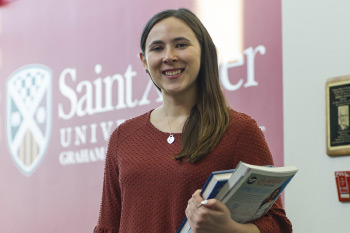Admission
What Type of Student Are You?

Freshman
The freshman experience at SXU is full of opportunities for intellectual, personal
and social growth.

Graduate
Saint Xavier University is for students who want more out of their future, and at SXU, a rigorous and interactive graduate curriculum will help you advance in your career.
Learn more
Transfer
As a transfer student, you'll have access to a transfer admission counselor to help you navigate transfer scholarships, credit evaluations, semester schedules and more.
Learn more
International
As an international student at SXU, you'll receive the opportunity to broaden your
educational, social and cultural experiences.

Veterans
As a Best College for Veterans and Military Friendly® institution, Saint Xavier offers many resources for its veteran students.
Learn more
Visiting
SXU welcomes all visiting students and prepares them to get ahead in their studies
and career development.

Academic Programs
Saint Xavier University is pleased to offer a wide variety of high quality academic programs to a diverse and talented student body. Saint Xavier University strives to provide its learning community with a solid foundation in liberal arts and professional education, establishing well-rounded members of society.
Explore Majors and ProgramsWhy SXU?
Quick Facts
-
24Average Class Size
-
3,520Students Enrolled*
*Fall 2022
-
16:1Student-Faculty Ratio
-
100%Undergraduates received an academic scholarship**
**2022-2023
Meet the Staff
Plan a Visit
We'd love to see you on campus! A visit to SXU is a great opportunity for you to meet with an admission counselor to discuss your academic background and interests and to take a tour of the campus.
Contact the Office of Admission
- 773-298-3050
- Toll Free: 844-GOTO-SXU (844-468-6798)
- Fax: 773-298-3076
- Email: admissionFREESXU
- M-F: 8:30 a.m. to 4:30 p.m.
Colleges of Distinction
Saint Xavier University is nationally recognized as a College of Distinction for supporting and maintaining an environment of engaged students, excellent teaching and academic offerings, and successful outcomes for our students with experiential learning, leadership and service opportunities, all within a vibrant and diverse community. For more information, visit the Colleges of Distinction website.

































